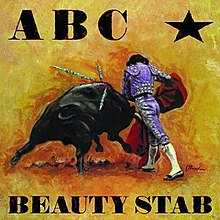| Beauty Stab | ||||
|---|---|---|---|---|
 | ||||
| Studio album by | ||||
| Released | 14 November 1983 | |||
| Recorded | August–September 1983 | |||
| Studio |
| |||
| Genre | ||||
| Length | 42:58 | |||
| Label | Neutron | |||
| Producer |
| |||
| ABC chronology | ||||
| ||||
| Singles from Beauty Stab | ||||
| ||||
| Review scores | |
|---|---|
| Source | Rating |
| AllMusic | |
| The Encyclopedia of Popular Music | |
| The Rolling Stone Album Guide | |
| Smash Hits | 6/10[4] |
| Uncut | |
| The Village Voice | A−[6] |
Beauty Stab is the second studio album by English pop band ABC, released on 14 November 1983 by Neutron Records, Mercury Records and Vertigo Records. The album was recorded over a period of three months between August and September 1983, in sessions that took place at Sarm Studios East and West, Townhouse Studios and Abbey Road Studios. It was a departure from the stylised production of the band's debut studio album, The Lexicon of Love (1982), and featured a more guitar-oriented sound.
The album was produced by ABC with Gary Langan, who had been the audio engineer on the band's debut studio album. The band employed the rhythm section of Andy Newmark (drums) and Alan Spenner (bass guitar)[1] both of whom had recently recorded and toured with Roxy Music at the time. The cover photography was by Gered Mankowitz.
On release, the album was received negatively by the majority of music critics. In a 1995 article, music journalist Simon Reynolds listed Beauty Stab among "the great career-sabotage LPs in pop history".[7] In retrospect, the band members themselves have been quite vocal in that they were less satisfied with the album with founding member Stephen Singleton leaving the band soon after promotion for the album was completed. Martin Fry later stated that "we were eager to go in a totally different direction [to The Lexicon of Love]. We didn't want to do a sequel. In retrospect, perhaps that is exactly what we should have done".[8] The album was certified Gold by the BPI for shipments in excess of 100,000 copies, but was not as commercially successful as its predecessor. It peaked at No. 12 on the UK Albums Chart and spawned only two Top 40 singles (neither of which made the Top 10).[9]
In 2005, a digitally remastered CD of the album was released with three bonus tracks.
- ^ a b DeGagne, Mike. "Beauty Stab – ABC". AllMusic. Retrieved 1 October 2011.
- ^ Larkin, Colin (2007). The Encyclopedia of Popular Music (5th concise ed.). United Kingdom: Omnibus Press. p. 32. ISBN 978-1-84609-856-7.
- ^ Sheffield, Rob (2004). "ABC". In Brackett, Nathan; Hoard, Christian (eds.). The New Rolling Stone Album Guide (4th ed.). New York: Simon & Schuster. p. 2. ISBN 0-7432-0169-8.
- ^ Rimmer, Dave (24 November 1983). "ABC: Beauty Stab". Smash Hits. Vol. 5, no. 24. p. 27.
- ^ Lester, Paul (February 1998). "The lexicon of loathe". Uncut. No. 9. p. 87.
- ^ Christgau, Robert (24 January 1984). "Christgau's Consumer Guide". The Village Voice. Retrieved 1 October 2011.
- ^ Simon Reynolds (1995), ""Unknown Pleasures: Great Lost Albums Rediscovered" (Melody Maker free supplement booklet)", Melody Maker (free supplement booklet), archived from the original on 31 October 2013,
Tusk ranks as one of the great career-sabotage LP's in pop history, alongside the Clash's Sandinista[!], ABC's Beauty Stab and Beastie Boys' Paul's Boutique; one of those albums by bands apparently on a creative and commercial roll who nonetheless wilfully confound their audience, motivated by artistic frustration, or fucked-up/fucked-off confusion, or simply because they've succumbed to a kind of collective death-wish.
- ^ "ABC's Martin Fry regrets not capitalising on early success". 27 June 2013.
- ^ "ABC". Official Charts Company. Retrieved 1 October 2011.